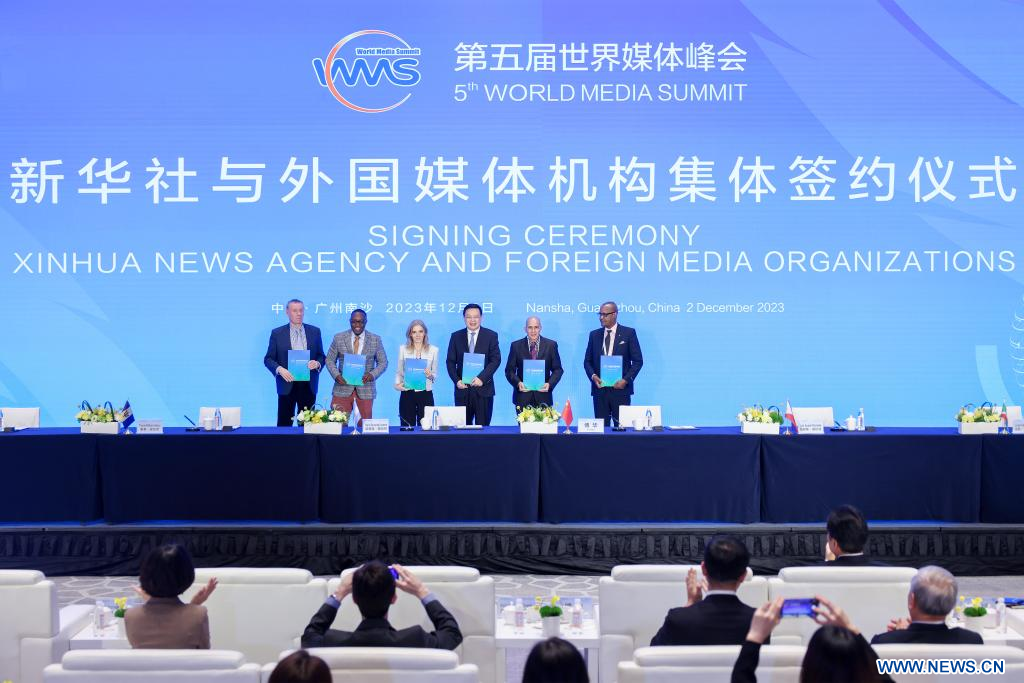World Insights: World media leaders discuss AI opportunities, challenges
► In an era of rapid technological progress, emerging Artificial intelligence (AI) has become a key factor reshaping the media industry.
At the ongoing fifth World Media Summit, participants share their insights and perspectives on AI, which has become a global buzzword.
Fu Hua, executive chairman of the World Media Summit and president of Xinhua News Agency, said in his keynote speech at the opening ceremony of the summit that we should embrace the innovation and technological changes, and strengthen research and development of AI, cloud computing and other technologies, enabling them to better serve the development of the media.
Narasimhan Ram, director of India’s Hindu Publishing Group, said figuring out how to use AI will bring opportunities for media development.
AI freed journalists from « rote task » and allowed them to focus on « higher impact journalism, » said Vice President of The Associated Press (AP) Chan Yim Kuen.
Echoing Chan, Sue Brooks, head of product development and agency strategy, Reuters News Agency, said AI will make journalism more efficient, liberating journalists from « routine translations and transcriptions so they can spend more time unearthing the stories that matter most. »
In her speech on the theme of « Trust » at the opening ceremony of the summit on Saturday, Brooks said: « If AI is going to become such a large part of our lives, we need to have trust that the algorithms are built for good and not for ill. »
In addition to enhancing efficiency and effectiveness, AI has brought about transformative benefits from optimized audience segmentation to in-depth analysis.
However, the allure of progress came with a shadow. The spread of fake news and misinformation, concerns related to intellectual property protection and ethical considerations in journalism need to be addressed properly.
UN Under-Secretary-General for Global Communications Melissa Fleming underscored in her virtual speech that AI could exacerbate the potential problems like « disinformation, conspiracies and hate that proliferate on social media » and « distrust in public institutions. »
President and Editor-in-Chief of Kyodo News Toru Mizutani specifically mentioned the challenges related to generative AI, such as copyright issues and measures against fake news.
Michael Mainville, member of the Agence France-Presse (AFP) Executive Committee and AFP Asia-Pacific regional director, said that along with other media groups, AFP has developed the Paris Charter on AI and Journalism, which sets out 10 principles for the use of AI by the media.
At a meeting among leaders of Xinhua News Agency, Reuters, AP and AFP on Friday in Beijing, Mainville stressed that « it is also very important to discuss the principles of how we will use artificial intelligence. »
Similarly, AP has issued guidelines on AI this year, including how and when it should be used. Chan said media organizations have to work collaboratively to push for a legal framework to ensure intellectual property is protected and content creators are fairly compensated for their work.
Meanwhile, media outlets have sought to strengthen cooperation with AI companies and among media organizations to better embrace the opportunities and address the challenges.
Thomson Reuters, a global provider of news and information-based tools, invests more than 100 million U.S. dollars every year on generative AI to better harness the technology to improve their service, said Brooks.
AP signed a cooperation agreement with OpenAI, the company that launched ChatGPT, to explore how their generative AI tools might help, Chan said at the summit.
TASS Director General Andrey Kondrashov called on the next World Media Summit to focus on AI as a main topic, collectively explore how to judiciously leverage AI to promote the development of the media industry.
« Doing nothing — waiting to see how this technology unfolds — just isn’t an option. It’s clear that we have to act, and we have to act now, » Chan said.
The ongoing fifth World Media Summit is being hosted by Xinhua from Dec. 2 to Dec.8 in China’s Guangzhou city of Guangdong Province and Kunming city of Yunnan Province.
Participants come from 101 countries and regions — representatives from nearly 200 mainstream media outlets, think tanks and government agencies, as well as international organizations.
Themed « Boosting Global Confidence, Promoting Media Development, » the summit addresses topics including bolstering media confidence, coping with opportunities and challenges presented by new technologies, exploring new markets in the digital age, and striving for a shared future in global media cooperation. ■
by Xinhua



